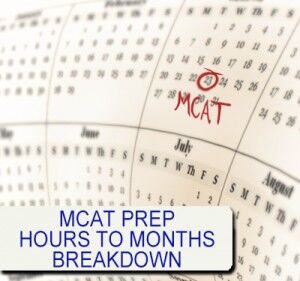 As an MCAT tutor I hear this question often. Students looking ahead to their exam date want to know how many months they should set aside in preparation for the MCAT.
As an MCAT tutor I hear this question often. Students looking ahead to their exam date want to know how many months they should set aside in preparation for the MCAT.
I realize that with so much to cover on the MCAT it’s overwhelming, and having a definite ‘number’ potential makes the task less daunting.
If you google this question you’ll come across some ‘very helpful’ articles suggesting you should plan to invest just 3 months or 300 hours.
This was great advice, for the OLD MCAT!
However, given that the new MCAT is both longer and covers more topics than the old exam, you’ll find that preparing for the new test will require a larger investment of time.
For quick overview of the MCAT sections, subjects, timing and more, stop and watch this video first.
Of course every student is unique, and so the length and method of studying must also be unique. For example, some who are retaking the MCAT may only need 3 months. In fact, I’ve outlined the different types of students I frequently encounter as an MCAT tutor and assigned each a different length of study.
MCAT Prep: How Much Time Do You REALLY Need?
In the above article I suggested the average length of time needed is 500 hours.
Why 500?
If the old 3.5 hour 5-topic MCAT required 300 hours of study, then the new 7.5 hour 8-topic MCAT should be nearly double.
I have worked with hundreds of students since the new exam’s introduction in 2015, analyzing their study habits, schedules, and progress from Baseline Full Length to final MCAT score. For the average student, the 500 hour number appears to be a solid target number for achieving a successful score.
Got it, I need to dedicate 500 hours. But the common question I still get is, IN HOW MANY MONTHS?
This is different for every single student. For example, Nayna scored a 518 with just 3 months of insane MCAT prep, while THIS STUDENT is putting in 8 months of solid prep.
This is assuming you’ve taken college level courses on nearly every subject, even if you’ve forgotten it all.
The first step to figuring out how many months is to determine how many hours you can devote to MCAT prep on a daily and weekly basis.
Let’s keep in mind that emergencies don’t check the calendar.
You can’t plan for illness, car trouble, or other urgent demands that delay your schedule. So let’s plan ahead and allow for the unexpected.
In coming up with the 500 hour estimate I took these unexpected study interruptions into account by assigning each month exactly 4 weeks or 28 days. Those remaining 2-3 days will allow you to handle emergencies and any catching up without freaking out. And hey, it simplifies our math despite for longer/shorter months.
I realize that many students preparing for the MCAT have not taken AT LEAST one of the required topics and will be self-studying.
The most common courses NOT taken by my MCAT Study Hall members are biochemistry, ONE organic or physics course, or psychology/sociology.
The more courses you have to self-study, the more time you’ll want to add on for learning this material from scratch.
Also keep in mind that every student learns at a different pace. How much time do YOU need for Phase 1?
So where do you fit those 500 hours?
Figure out how many hours you can devote per week then find your category accordingly.
40 Hours per Week: MCAT Study As A Full Time Job
If you’re a student who is out of school and quit your job so that you can focus 100% of your time on MCAT prep, you’ll have to view MCAT prep as a full time job.
This DOESN’T mean you should be cramming for 12 hours per day at 84 hours per week. You’ll burn out in just a few days.
Instead, make your full time MCAT schedule a well-rounded and healthy routine.
Allow time for working out in the mornings, hanging out with friends or relaxing by yourself 1-2 nights a week, and most definitely getting a full night’s rest.
I also recommend getting a volunteering or shadowing position for a few hours a day once a week. This serves 2 purposes:
- Gets you out of that ‘MCAT study’ mode and forces you to ‘see the world’
- Puts you into a medical/healthcare setting, which will remind you WHY you’re sacrificing so much for the MCAT.
One of my students volunteers at an emergency clinic in an underserved community. She is reminded on a weekly basis exactly what happens to people’s health when preventative health education and affordable medical care are lacking in communities.
Every time she leaves that clinic she is determined to work hard and reach her goal so that one day, SHE can be a leader in her community teaching people HOW to take care of themselves before a minor illness turns into an emergency.
40 hours per week at 7 study hours per day for 6 days, or 8 study hours per day for 5 days a week, that’s a full time job.
At 40 hours per week it will take you approximately 12.5 weeks or just over 3 months to prepare for the MCAT.
This is more intense than it sounds and should be accepted with caution!
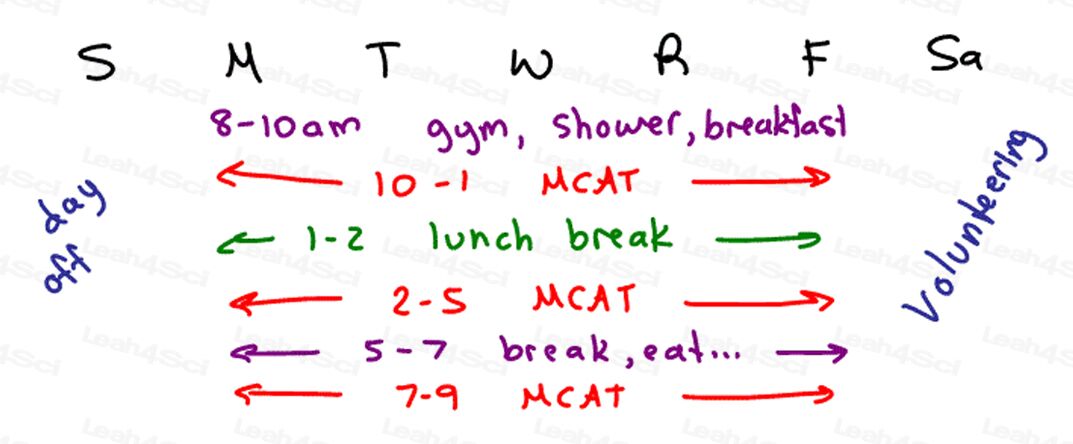
Sometimes taking a study break is MORE IMPORTANT than cramming in a few more hours of information. This schedule is highly unlikely for students taking classes, working, or taking care of a family, especially those with young children.
30 Hours Per Week: Balancing MCAT With Average Responsibilities
If you feel that 3 months studying 40 hours per week is too intense, but still desire to treat MCAT prep as a full-time occupation, I recommend devoting 30 hours per week.
This can be broken down anywhere from 4.5 daily hours for 7 days, 5 daily hours over 6 days, or even 6 daily hours for just 5 days.
This type of schedule leaves you time for taking care of a family, working a part-time job, or taking a couple college courses. This puts your MCAT prep at borderline cramming so I don’t recommend this schedule if you have more than 1 responsibility outside of MCAT prep.
At 30 hours per week you’ll need approximately 17 weeks or just over 4 months to prepare.
This of course assumes that you are making regular progress and improving on your full length exams as needed. Sometimes the extra time between practice exams is critical for allowing your brain to ‘catch up’ and keep up.

20 Hours per Week: Part Time MCAT Study
I recommend devoting 20 MCAT study hours per week if you’re juggling a full-time but non-strenuous job, a regular semester schedule, or a family that requires lots of time and attention, especially those with little kids.
20 hours per week gives you great flexibility. You can devote anywhere from 3 hours per day every day, to 6.5 hours per day just 3 times a week
At 20 hours per day you’ll need approximately 25 weeks or just over 6 months to prepare.
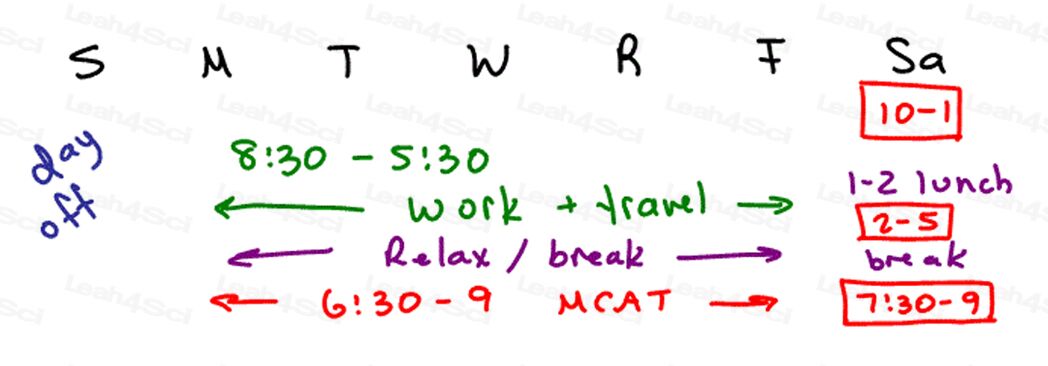
Many 30-hour per week students wind up falling into this category as work and life sometimes gets the better of their schedule. This is why I recommend starting out with something like this 6-month study plan.
15 Hours Per Week: MCAT Study On A Packed Schedule
Many students prepare for the MCAT while juggling at least 2 full-time demands including negotiating school work and family.
15 hours per week is the bare minimum I recommend students spend preparing for the MCAT. At a minimum, this comes to just over 2 hours per day every single day.
You can also manage this at 7.5 hours twice a week although not recommended. Try for a healthy balance of at least 4 days a week (4 hours) or 5 days per week (3 hours)
500 hours at 15 hours per week comes to 30+ weeks or just over 8 months of prep.
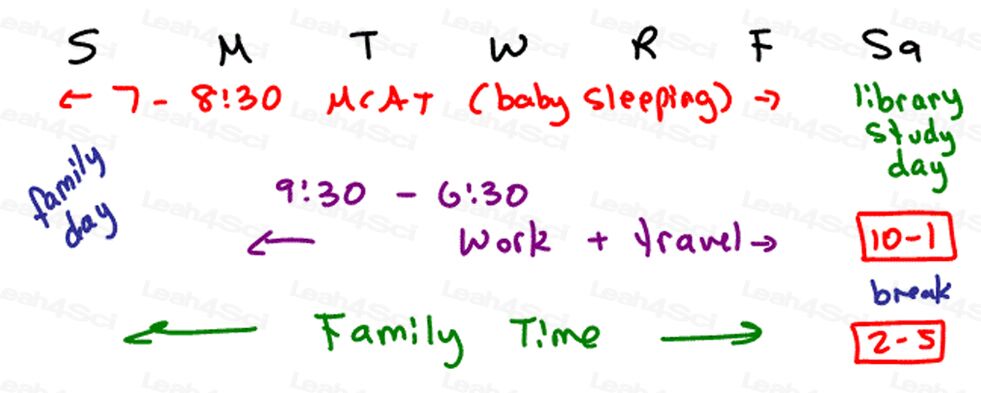
This gets tricky during the final weeks of your prep when you’re required to take a weekly 7.5 hour exam AND review.
This is the absolute MINIMUM amount of studying I’d recommend!
If you currently find you can devote LESS THAN 15 hours per week I challenge you to evaluate your schedule and decide what you can cut to free up some more time. Perhaps you can cut back on your work hours, take fewer classes during the upcoming semester, or find a babysitter to look after the kids while you sneak away for a few hours of solid study time.
A student recently told me that she can only devote 5 hours on a Sunday to MCAT prep.
There’s no way that’s enough. By the time she finishes chapter 1 in each of the 7 sciences, it’ll be a month later with dozens of chapters still to go. This is not a strategy that will work if you hope to retain what you’ve studied.
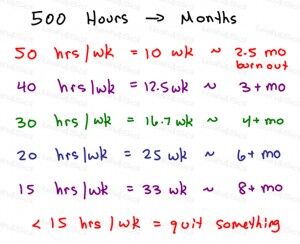 I realize that what I’m asking may sound unreasonable, but let’s be realistic for a moment.
I realize that what I’m asking may sound unreasonable, but let’s be realistic for a moment.
The MCAT is likely your biggest hurdle for getting into medical school. The discipline you learn while preparing for the MCAT will only help you to prepare for your demanding medical school curriculum.
If you can’t consistently carve out 15 hours per week for MCAT prep, how will you figure out how to devote that amount of time (and more!) as a medical student?
So when you think about your MCAT study timeline, consider how much time you’ll need in terms of the number of months you’ll need to prepare, AND also the number of hours you’re able to commit AND STICK TO on a weekly basis.
Have you already taken the MCAT? Are you considering retaking it? Consider this article for guidance


